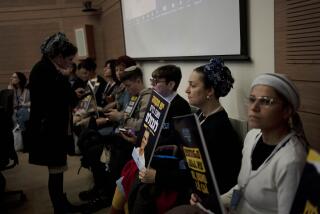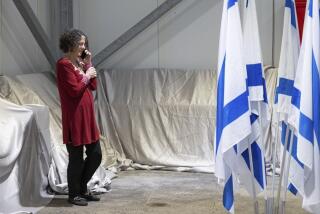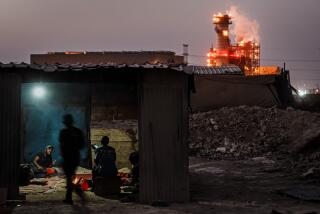Kuwait Is Hoping for Word on Its Missing
KUWAIT CITY — Latifa Khashti’s son said his last goodbye at the doorstep in the fall of 1990 before heading out into the desert to hide. Wasmi Jasim’s husband was taken from their living room around the same time by Iraqi troops. And Naima Lahoud lost her three brothers in a neighborhood roundup, only to be jailed herself when she tried to win their freedom.
“They wanted me to confess that my brothers were in the resistance,” she said, her tears framed by her black veil. “I was tortured. They used handcuffs, car batteries. They put electrical wires on genitals, temples, every sensitive part. They injected you with drugs. It was a slaughterhouse.”
After four months in squalid prisons, the Iraqis let Lahoud go. But her brothers have not been heard from since.
As the Persian Gulf region braces for another war, Khashti, Jasim, Lahoud and tens of thousands of other Kuwaitis hope that any conflict will bring at least one silver lining: that they’ll finally learn what happened to their loved ones after years of dread and doubt.
Many of the 800,000 citizens in this tiny emirate know at least one of the 605 missing prisoners of war, or know a POW’s immediate family member or friend or third cousin by marriage. For the past decade, Kuwait has campaigned tirelessly to bring back the missing or close their files so families and the nation can move on.
It is hard to overstate the political and emotional importance of the issue for Kuwaitis and its impact on the national consciousness, which some here compare in importance to Pearl Harbor or the Civil War for Americans. Signs, banners, yellow flags, even gas station receipts urge the world to remember the missing.
Kuwait’s emir has stopped attending high-profile receptions until the issue is resolved, even as the nation’s diplomats urge U.S. and British military commanders here to put it near the top of any post-invasion checklist. These guests generally do not need reminding that Kuwait has put two-thirds of its country at the disposal of their troops in a region famous for frowning on outside meddling.
As Kuwaiti leaders have charted a course over the past decade between international apathy and Iraqi intransigence, they’ve grown more adept at marshaling military intelligence, citing U.N. resolutions and using moral suasion to advance their cause.
Well aware that their land is a mere speck on the global map, Kuwaitis have attached the issue to larger security, humanitarian and foreign policy matters to gain traction. They also have sought to translate their few hundred missing into terms the bigger powers can understand.
“When the Chinese say you’re only talking about 605 people, I tell them that’s the equivalent in our population” of about 1 million Chinese, said Duaij Anzi, advisor on the issue to Kuwait’s Council of Ministers.
“If we’ve succeeded in doing one thing, it’s keeping this issue hot. Otherwise, people forget and it falls away.”
Kuwait is sharing intelligence with the U.S. as chances increase that an invasion of Iraq would afford the world a better look at President Saddam Hussein’s institutions of torture and repression.
There’s a degree of happenstance in the case files: Most of the 605 missing in action were in the wrong place at the wrong time after Iraqi troops invaded the emirate in 1990. Although 131 were Kuwaiti soldiers and 85 were police officers, most were civilians working as doctors, engineers, students and the like.
A pattern that has emerged from extensive debriefing of released prisoners suggests that the Kuwaitis faced as many as three levels of interrogation, with release, execution or death by torture, neglect or illness possible at each stage, depending on luck and the value placed on their heads.
The process generally started with interrogation by the unit that seized the prisoners, leading to a possible grilling by more senior officers in the southern Iraqi city of Basra and eventually a transfer to the Republican Guards or an intelligence agency in Baghdad.
Most of the 605 were seen by other prisoners in Iraqi custody at some point, held in facilities that included the public security building in Basra, the Bou Skhair prison midway between Basra and Baghdad, and a Republican Guard camp in Tikrit, about 100 miles north of Baghdad.
As the years have passed, sightings have fallen off and trails have grown cold, prompting hucksters and opportunists to jump into the breach. Several dozen families have been approached by people claiming to have seen their relatives in Iraq or to have information on their whereabouts. Few reports check out.
“Eventually these cases all turn out to be people trying to make money,” said Abdul Hameed Attar, a volunteer at a government-sponsored POW-MIA center, where families meet regularly in a giant hall ringed with pictures of the missing. “The families start boiling. It makes them so mad.”
Attar said he was approached recently by people claiming to have information on his missing son, Jamal, who was 26 and worked for Kuwait Television at the time of the invasion. They knew quite a few details about him, Attar said, so he played along and agreed to meet them in Jordan.
Eventually they requested $20,000 in “travel expenses” to gather more information in Iraq. When Attar offered to hold the money in trust and told them Iraq recently killed two people nosing around on POW issues, they quickly lost interest.
Despite the long years of silence, Kuwaitis say they draw hope and lessons from the 1980-88 Iran-Iraq war. Baghdad captured tens of thousands of Iranians and denied for well over a decade that it held any -- in some cases despite Iraqi television footage proudly showing captures -- only to release the prisoners recently when it suited its purposes.
Kuwaitis suspect that those who may still be alive are bunched in groups rather than scattered. This would reduce the risk of word leaking out from other prisoners and increase cooperation, given that any escape attempt or defiance would jeopardize the lives of the others.
Once any U.S. invasion begins, Kuwaitis say they expect people close to Hussein to start volunteering information and producing POWs or their remains, hoping to distance themselves from the regime and avoid possible war crimes charges.
Still, 12 years is a long time -- even for families clinging to the slightest possible hope.
“In truth, any mother or father hates to say their child isn’t alive, but most here feel that way,” Attar said. “Twelve years isn’t a short time, and we’re talking 12 years in Iraq, not someplace else.”
Many families have additional and practical reasons for wanting the truth. Under Kuwaiti law, influenced by Islam, a woman faces restrictions in remarrying or inheriting property without conclusive proof that her husband is dead.
As political pressure has increased on Kuwait’s leadership over the issue, the oil-rich emirate has put together a program that would be the envy of POW-MIA groups in the United States.
Relatives by the thousands have had DNA samples taken to help with future identification of remains of the missing, should aging parents or others die.
Immediate families receive a range of benefits, including a stipend of between $12,000 and $18,000 a year, an exemption from social insurance premiums and preferential access to education, housing and medical care, as well as the guaranteed return of jobs, pensions and other benefits should the missing reappear.
Over the last decade, Iraq has denied knowledge of the prisoners, ignored U.N. resolutions calling for cooperation, canceled international meetings on the issue, accused the Kuwaitis of making the whole thing up and evaded U.N. envoys -- all familiar tactics, Kuwaitis note, encountered by those in search of Iraq’s alleged weapons of mass destruction.
“If they start feeling under humanitarian pressure, they’ll open the files, give us a few crumbs, put the fire out, then close it again,” said POW affairs advisor Anzi.
Periodically, Iraq has invited Kuwait or its representatives to come look for prisoners. But it has added so many conditions that the offer becomes meaningless, Kuwaitis say.
For her part, Lahoud doesn’t care much about all the diplomatic maneuvering. She just wants her three brothers back.
“They’re with me all the time. When I eat, it’s as if they’re still living with me,” she said. “What did we ever do? All this just because we’re Kuwaitis?”
More to Read
Sign up for Essential California
The most important California stories and recommendations in your inbox every morning.
You may occasionally receive promotional content from the Los Angeles Times.










